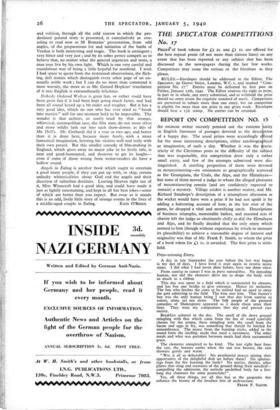REPORT ON COMPETITION NO. 15
AN eminent writer recently pointed out the extreme rarity in English literature of passages devoted to the descr tion of a happy day. The usual prizes were accordingly ered for the most interesting descriptions, either autabiogra hical or imaginative, of such a day. Whether it was the cen- tricity of the Christmas posts or the difficulty of the subject that was responsible, this competition drew only a rather small entry, and few of the attempts submitted were dis- tinguished. A startling proportion of them were devoted to mountaineering—on eminences as geographically scattered as the Grampians, the Urals, the Alps, and the Himalayas— but none of them moved a judge to whom the alleged pleasures of mountaineering remain (and are confidently expected to remain) a mystery. Village cricket is another matter, and Mr. Richard Stanhope's description of a triumphant afternoon at the wicket would have won a prize if he had not spoilt it by adding a hairowing account of how, in the last over of the game, he dropped a vital and mortifying catch. Descriptions of business triumphs, memorable bathes, and assorted acts of charity left the judge as obstinately chilly as did the Himalayas and Alps, and he finally decided that the only entry which seemed to him (though without experience by which to measure its plausibility) to achieve a reasonable degree of interest and originality was that of Mr. Frank F. Smith, to whom the prize of a book token for Lt Is. is awarded. The first prize is with- held.
Prize-winning Entry.
A day in late September the year before the last war began is my day of days. I have lived it over again in reverie many times. I did what I had never done before, have not done. since.
From sunrise to sunset I was in purls naturalibus. No intiuding human, nor did the elements drive me to drape the body with so much as a ribbon.
This day was spent in a field which is surrounded by streams, and has but one bridge to give entrance. Hence its seclusion. The boy who fetches the cows to be milked had no need to enter the gate admitting to the field. The kine met him. That farmer's boy was the only human being I saw that day from sunrise to sunset, alone yet not alone. The folk people of the pastoral comedies of Shakespeare appeared as I made them utter their lines. They were my companions that day and proved rare society.
Breakfast ushered in the day. The smell of the dewy ground mingling with that which came from the fire of wood carefully chosen for the aroma, these mingling with the smell from the bacon and eggs in fry, was something that should be bottled for remembrance. The music from the burning sticks, added to the sound from the sizzling, made that meal a sacrament. The other meals and what was partaken between meals had their sacramental grace.
The elements conspired to be kind. The just right heat from the sun, the breezes cooler when the sun was hottest, the rain showers gentle and warm.
" Was it all so delectable? No pestilential insects seizing their opportunity of the delightful dish set before them? No splutter- ings from the fire burning the body? No nettles, thistles, other plants that sting and creatures of the ground doing their mischief— compelling the admission, the entirely unclothed body for a live- long day clamours for some 'protection?",
Yes, all these things, yet ' all this but as the gargoyles that enhance the beauty of the loveliest bits of architecture.
FRANK F. SMITH.


































 Previous page
Previous page